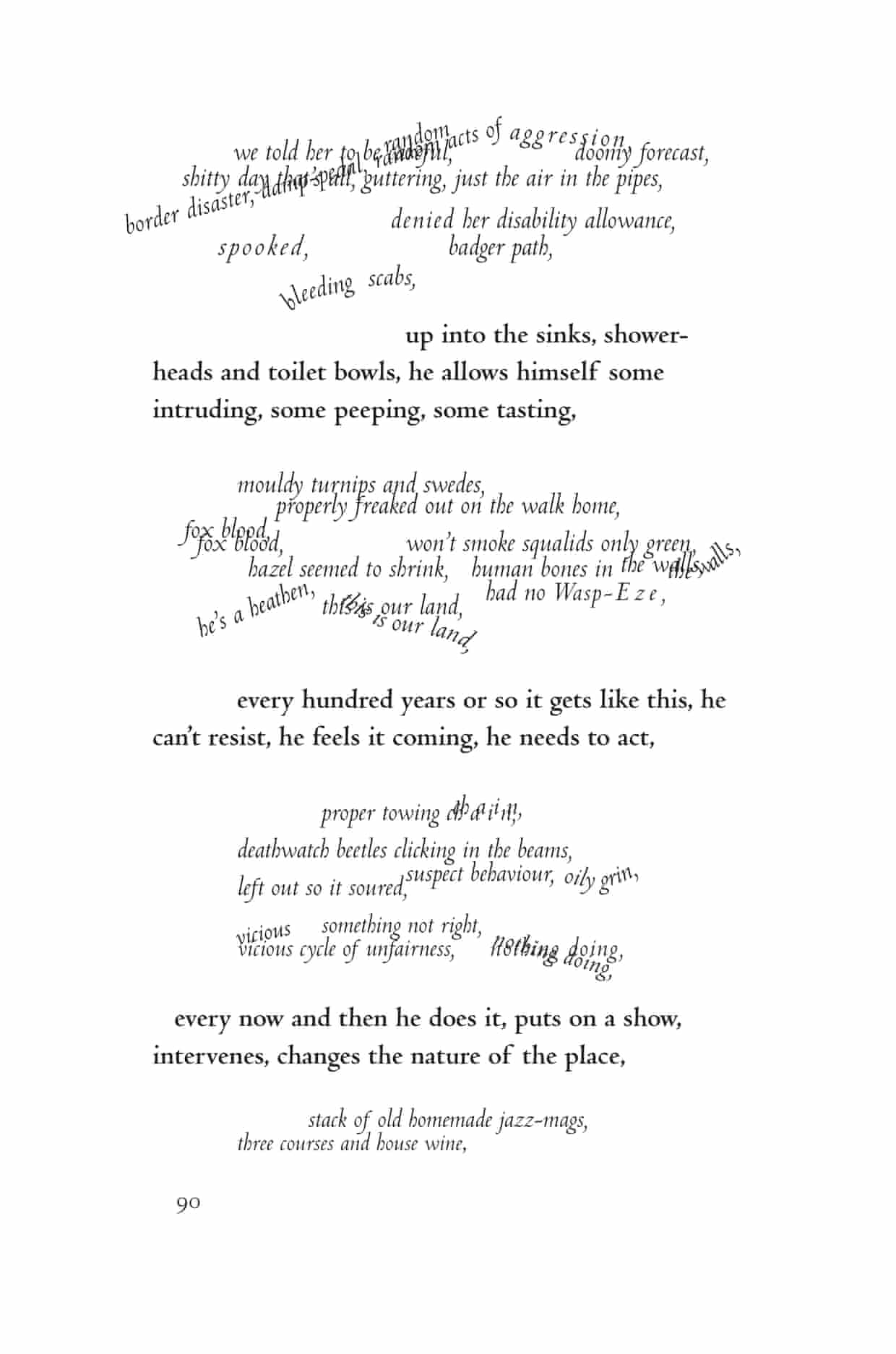He wants to kill things, so he sings. It sounds slow-nothing like tarmac bubbles popping in a heatwave. His grin takes a sticky hour. Cheering up, he chatters in the voice of a cultured fool to the dry papery wings and under-bark underlings, to the marks he left here last year, to the mice and larks, voles and deer, to the quaint memory of himself as cyclically reliable, as part of the country curriculum. He slips through one grim costume after another as he rustles and trickles and cusses his way between trees. He walks a few paces as an engineer in a Day-Glo vest. He takes a step in a dinner suit, then an Anderson shelter, then a tracksuit, then a rusted jeep bonnet, then a leather skirt, but nothing works. ... He clomps through the wood, wide awake and hungry for his listening. [p. 3]
I first attempted to read this as part of a 'green man' triptych, along with The Green Man's Heir and Silver in the Wood. However, it is not a book that can easily be read on a Kindle: the playful typography is rendered, in the ebook, as images rather than text.
... And so I bought the first hardcover book I've purchased for a while.
That wild typography represents the 'English symphony' of human conversation (or perhaps thought) in a Home Counties village. This symphony is savoured by Dead Papa Toothwort, a protean genius loci who's been around since the Domesday Book, Dead Papa Toothwort roams the village, sometimes wide as an acre, sometimes smaller than a flea, shifting from form to found form according to the materials in his vicinity. And the voice he savours most is that of Lanny, child of Jolie (who's working on a gory thriller) and Robert (who commutes). Lanny is most at home in the woods and hidden places of the village, building dens and leaving notes for whoever might find them; his parents love him but don't understand him (though Jolie, at least, values his sweet weirdness). Paul, a renowned elderly artist who's retired to the village, is asked by Jolie to do art with Lanny, and the two hit it off.
Dead Papa Toothwort is not a tame genius loci. The villagers may be fond, even proud, of their local legend ("he fondly remembers how much more frightening he was when the village children drew him green and leafy" [p. 45]) but Dead Papa Toothwort is a force of nature, and of change. "...every now and then he does it ... changes the nature of the place" [p. 90].
When Lanny goes missing, the village 'symphony' turns nasty, casting Jolie and Robert as neglectful parents, Paul as a paedophile, Lanny himself as something unnatural. The 'ecosystem of voyeurism' is in full flood. But Dead Papa Toothwort has not finished with Lanny, nor with the three adults, the three incomers.
Max Porter's writing is delicious, rollicking along gleefully with sheer joy of words and a disinclination to spare our delicate sensibilities. (Dead Papa Toothwort is as likely to take the shape of a pink-strangled lamb or a used condom as a mess of ivy or a bark-armoured form striding towards the kissing gate.) The voices of Jolie, Robert and Paul are distinctive, but frankly dull when set beside Dead Papa Toothwort's relish of language. While the actual story of Lanny is relatively slight, Porter's dissection of English village life, with its insularity and rumour and pettiness -- as well as kindness, creativity and wisdom -- is thoughtful and unsentimental. It's not coincidence that Paul is driven to destroy a postcard of an Eric Ravilious print that shows an idyllic past.
Rich, unnerving, physically and metaphorically lovely. Now I need to read Grief is the Thing with Feathers ...


No comments:
Post a Comment